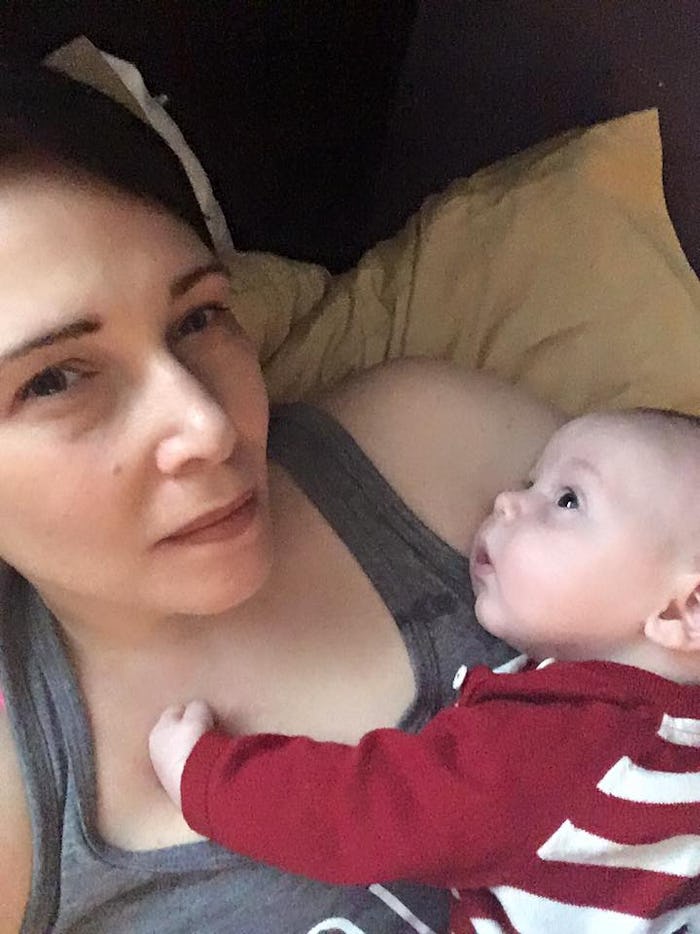Life

9 Post-Baby Feels You Shouldn't Let Your Partner Blame On Hormones
My husband is one of my favorite people on the planet, and literally one of the kindest and most caring people I know. But I learned the hard way that even the most awesome partners might not be immune to cultural stereotypes about "hormonal" postpartum women. Now, I am not saying that post-baby hormones aren't a thing (because they are), or that I didn't experience my fair share of them (because I did), but there are postpartum feels you shouldn't let your partner blame on hormones, no matter what.
This dismissive approach to all the feelings most postpartum women are bombarded by is, in my opinion, just another way our culture (and our partners) ignore women's real emotions and invalidate their experiences. Recovering from childbirth is a huge ordeal — physically, psychologically, and emotionally, Between sleep deprivation, postpartum depression, and healing physically from literally growing a human inside your body, the last thing you need (or probably appreciate) is your partner telling you that whatever it is you're feeling is "just hormones." In fact, if you ask me, the word "just" shouldn't be in your vocabulary when you're describing your partner's postpartum experience, because you probably have no idea what they are going through.
When your partner is recovering from childbirth I highly recommend not telling them how they feel, how to feel, or why they are feeling the way they feel. Instead, try asking them how they feel and what you can do to help. I can guarantee blaming their mood on hormones won't make that list. In the end and always, the little things often make the biggest difference, so make sure you pay attention to your postpartum partner and stay away from invalidating their experiences in the following circumstances (or, you know, ever):
When You Are Angry With Them
It's infuriating when my partner blames my anger on "hormones." I mean, I am not saying that my postpartum hormones or sleep deprivation don't make me a bit more sensitive or impatient, because they do, but most of the time I get angry with him for very legit reasons. When he blames my anger on hormones, it feels at minimum like he's making a joke about my feeling, which sucks and sometimes feels like a subtle form of gaslighting. My anger is valid, and I shouldn't be made to feel otherwise.
When You Are Exhausted
Sleep deprivation is real, and while hormones can play a role in disturbing your sleep postpartum, calling my exhaustion a symptom of hormones doesn't do anything to change the fact that I am tired AF. It feels pretty dismissive, actually.
When You Are Starving
I'm not hungry because I am hormonal. I am hungry because I am recovering from growing a human in my body, pushing it out of my vagina, and creating food for it with nothing but my body, good sir. Instead of dismissing my hunger, just feed me.
When You Are Overwhelmed
Caring for a newborn involves brief periods of calm, punctuated by moments of crisis and shear terror. It's easy to get overwhelmed by the many tasks involved with childcare, recovery, and all of the other things on a person's plate, especially when you are tired and hungry, too. Feeling overwhelmed is pretty much the natural state of new moms, and not hormone-related at all.
When You Have Anxiety
Postpartum anxiety is real, and it can be intense and debilitating. So when I am awake staring at the baby in the middle of the night, counting diapers and worrying about our baby's health and wellbeing, it's probably not a great idea to accuse me of being hormonal. Instead, tell me you are concerned about me.
When You Need A Break
Telling your partner you need a break doesn't make you a bad mom or "hormonal," it makes you resourceful. If your postpartum partner says they needs a break, don't you dare call her hormonal. Instead, ask her how long you should let her sleep or where to book a spa day.
When You Don't Feel Well
Having a baby doesn't render a person incapable of assessing their own needs. After my second child was born, I felt lightheaded, had a headache, and saw stars. Both my (now ex) husband and the nurse suggested I was having a panic attack. Nope. I had postpartum preeclampsia. I could have died, all because they blamed my hormones. That's not OK.
When You Are Depressed
Postpartum depression can be serious. It feels like your world is crashing down, or worse, that everyone in your world would be better off without you. I freaking hate how mental health disorders are treated like they are no big deal, and that people could snap out of them if they wanted to, especially when the person suffering is a woman. If left untreated, postpartum depression can be deadly. It's not just hormones and shouldn't be dismissed as such.
When You Are Disappointed
Being a new mom is hard AF and things don't always (or in my case, rarely) go as planned. Being disappointed is a natural response to reality not meeting your expectations. Things like not having the birth you hoped for, not being able to breastfeed, or having health unexpected health complications, or recovery setbacks are disappointing, and feelings of disappointment or frustration are natural responses, not "hormones."
Watch Romper's new video series, Romper's Doula Diaries:
Check out the entire Romper's Doula Diaries series and other videos on Facebook and the Bustle app across Apple TV, Roku, and Amazon Fire TV.